Welcome from our Chair Kathryn Lavery
Hello and welcome to our February edition of Trust Matters.
The Holy month of Ramadan has begun, and I want to wish everyone observing this religious festival “Ramadan Mubarak”. Some of our colleagues have kindly shared their thoughts with us on what Ramadan means to them, and I hope you will find them as inspiring as I do.
I am very proud to be part of an organisation which will be supporting our lowest paid colleagues by paying them the real living wage. As of 1 April 2025, we will be one of a modest number of trusts in the country to do this and it is our commitment to our strategic promise 25 which looks to tackle poverty. We know that those on the lowest incomes are more likely to have a greater risk of ill health and low emotional wellbeing. By paying the real living wage we are helping those who need support the most and hopefully attract other people to come and work with us.
We are also working towards promise 2 and supporting our many colleagues who are carers. Many of us will become carers at some point in our lives and it can be challenging to juggle work and caring responsibilities. The Carers’ Network offers you the chance to meet with others and receive their support and practical advice. It is only one part of this promise, but an important one.
As you know we are experiencing climate change and some of you may have already experienced extreme weather conditions such as flooding. This was why we held our first climate adaptation day to help us to better understand, plan and work towards future proofing our services against flooding, heatwaves, and poor air pollution by 2035. An important first step will be our work on a revised medium-term approach to remote working at the trust, which Carlene Holden is leading this spring.
Although Trust Matters often contains positive improvements that you are making for our patients, carers, and communities, myself, and other Board colleagues are very aware of the pressures, difficulties, and challenges of working here, and in the whole NHS, at the moment. The latest national guidance asks trusts like ours to make ‘difficult choices’ at pace about financial stability, to look to reduce stays in wards and restrictive environments, and to look after more people within existing teams. I hope that, through channels like the Friday video log, through learning half days, time to talk, and in forums including senior leadership teams and our clinical leadership executive you have opportunities to be heard and to find out what the future may hold.
Finally, I want to mention our trust charity Your Hearts and Minds. It is a local charity that supports people living in Rotherham, North Lincolnshire, and Doncaster. Please consider our charity when you are planning your fundraising activities. All the funds go towards supporting activities, projects, education, and research to improve the care and experience of our patients.
Until next time, please take care.
Kind regards,
Kathryn
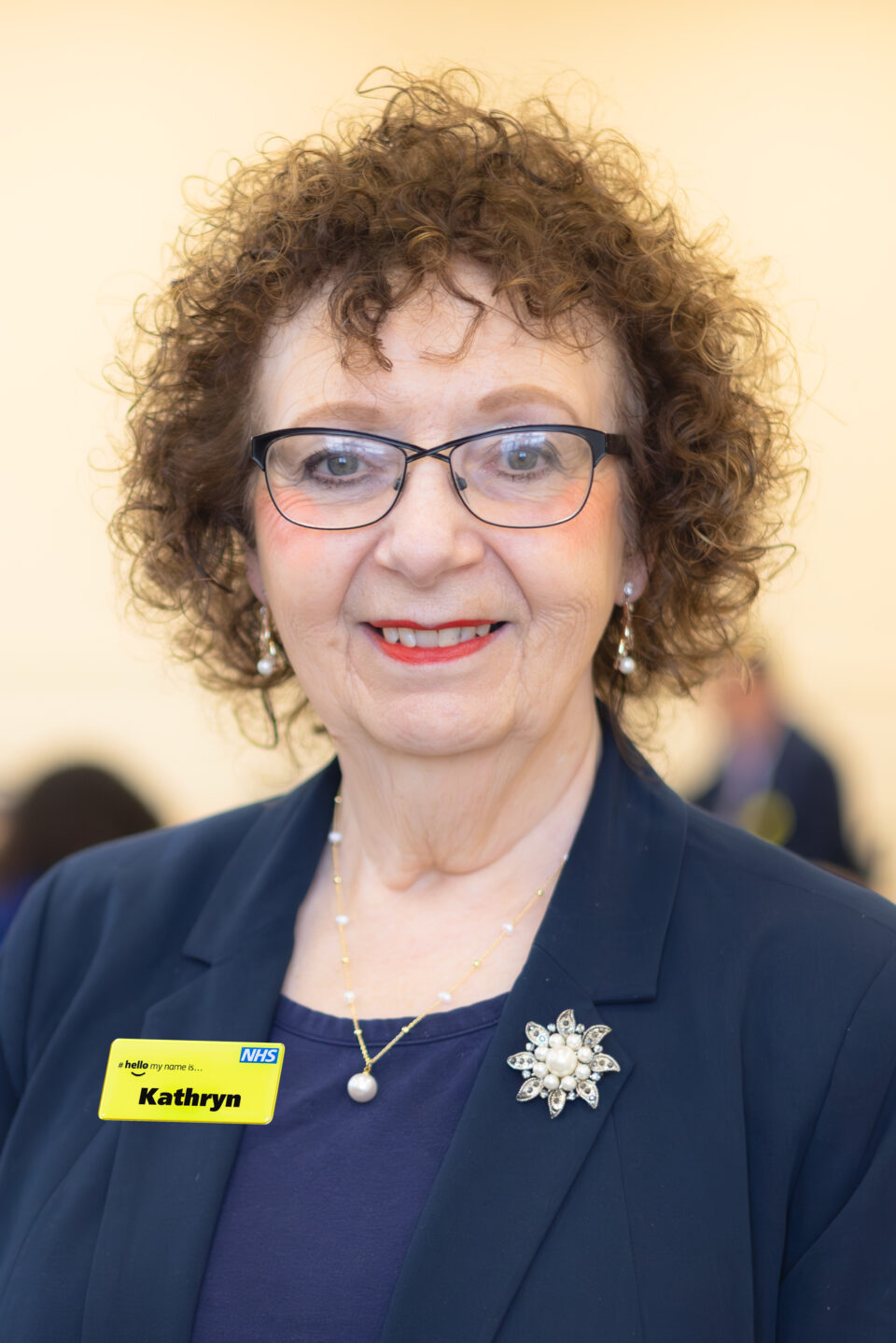
If you’ve a story to tell let our Communications team know at rdash.rdashcommunications@nhs.net.
We’re a real living wage employer
As we set out to do in our strategy under promise 25, from 1 April 2025 we will pay the real living wage. This means that we will support our lowest paid colleagues by paying them £12.60 an hour to help them to meet their everyday needs.
We are doing this because we believe our colleagues deserve a wage which helps them to live a life where they can keep up with the cost of living. Research in this area has also shown that low incomes can impact on both physical health and emotional wellbeing, and we wanted to address these inequalities within our workforce.
The real living wage is the only wage which keeps up with the cost of living. It is a rate which is voluntarily paid by a small number of employers and is above the Agenda for Change pay rates. Nationally about 30 trusts have chosen to pay the Real Living Wage.
Carlene Holden, Director of People and Organisational Development, said: “Becoming a real living wage employer shows how much we value our people. It delivers on our strategic promise 25 and means our colleagues will benefit from receiving a pay rise as a result of introducing this.”
Here is an explanation of the difference in pay between Agenda for Change, the National minimum wage and the real living wage:
- Agenda for Change: Band 2 from £12.08 per hour
- National minimum wage (set by the government): Currently at £11.44 per hour, will be £12.21 from 1 April 2025.
- Real living wage from 1 April 2025: Band 2 from £12.60 per hour.

Quality improvement (QI) poster contest
The quality improvement (QI) poster contest is here.
In September 2024, our Chief Executive confirmed that this coming 30 September 2025, we would host our first ever QI poster contest, complete with a top prize of £5,000.
The poster can describe any audit, research project or improvement activity that is taking place or has taken place since 1 January 2024.
The aim of the contest is to recognise assessments of innovations, changes or ideas in any discipline clinical, or non-clinical. The trust has created this contest to support individual clinicians, multi professional teams, and leaders to document, test, and peer review our practices.
The idea does not have to have worked. Some of the best posters may test a project which did not in fact succeed, and suggest learning from that.
The judging panel will be a multi-professional one, drawn from across the clinical leadership executive, and will also include peers and patients (because we’re RDaSH!). Diarmid Sinclair will chair the panel.
A few quickfire questions
Does it matter if the poster has been displayed somewhere else, like a conference?
No. That’s fantastic. In fact, it would be great if posters used in this contest are displayed elsewhere.
What is a quality improvement poster?
A poster will describe a project and describe the proposed or delivered study. It will include data, analysed, to allow a conclusion to be reached and recommendations made.
What makes a good poster?
It needs to be understandable to the person looking at it. It needs to draw them in and engage them. But it also needs to allow someone not involved in the project to understand how the work was done, not just what it has concluded.
Is this just research posters?
No, but research is an importance part of the trust. Deep skills in developing ideas and posters exist within our Grounded Research team.
There are four prizes which will be adjudicated on the day of the conference:
- most valued poster in the eyes of senior leadership delegates
- most impactful project or proposal as assessed by the judging panel
- best study or project design as assessed by the judging panel
- best quality improvement poster, RDaSH 2025, as assessed by the judging panel
Let’s discuss the money
NHS Planning Guidance (from the Government and NHS England) for 2025 and 2026 makes clear that trusts must focus first and foremost on meeting their financial duties, making difficult decisions if necessary to achieve a balance of income and expenditure.
Trust Matters takes a look at some facts, and questions that we often hear.
Where do we get our money from?
The trust gets most of our money from two integrated care boards (ICBs): one in South Yorkshire, and one in Humber and North Yorkshire, which includes our services in North Lincolnshire. These ICBs get their money from NHS England, according to a formula set by Parliament.
Our next biggest “investors” are local authorities, particularly Doncaster and North Lincolnshire. We also receive money for education, mostly through placements we have for different clinical professionals including resident doctors, at undergraduate and postgraduate level. And we have money for research from national bodies and commercial companies.
What happens if we cannot set and deliver a balanced budget?
If a trust cannot “balance the books” then they will likely be subject to intervention. That intervention can take a variety of forms: changes in personnel, aggregation with other trusts, or, most likely, restrictions on the decisions that we are allowed to make locally. This could include bans on hiring to posts or the need for extra approvals for funding. It may include service closures.
It is important to be clear that the trust has money to pay our payroll. There is no risk of any delay or problem with salaries.
How do we manage our money?
We typically take our money and set up local budgets. The Chief Executive, who is the accountable officer, delegates management of those budgets to named individuals. Our budgets are set at group (five care groups and one corporate) level, and, in 2025 to 2026 at directorate level. Service managers and others in directorate management teams are asked to manage those budgets. Our income does not vary, so these budgets are expenditure budgets, comprising pay costs and non-pay costs like medicines or consumables.
My budget is not big enough, what can I do?
Our budgets at directorate level are sizeable, typically a few million pounds, so in most cases the best answer is to work together at that scale. At group level our budgets are over £20m, with some closer to £45m. If a new expenditure is needed, we have a once-a-year process, our Investment Fund, to make choices about new funding.
In addition, the director of finance and estates and chief executive hold a small contingency fund for exceptional situations.
What about pay awards?
Pay awards are negotiated nationally. And the trust will pay them. In recent years, the additional money provided by the ICB and NHS England for pay awards has been less than the cost of them. This means that additional cuts or savings need to be found to make up the shortfall.
Why do we have to make savings or cuts?
Every year, the NHS is asked to make financial savings. The income that the trust receives is reduced by this amount, and so, to meet our costs, the trust has to reduce its expenditure to balance the budget. In addition, we seek to generate further savings to allow us to move money around (recycling the money, in effect) to put more money into patient care and to meet costs that are covered nationally, for example the rising cost of energy.
Who decides what cuts to make and what investments to make?
Usually, the savings are put forward by budget holders to achieve a balance budget. They are assessed for their safety, their equality impact, and their fidelity to trust policy, before being considered in budget sign off meetings or delivery reviews. Larger savings, or those considered most risky are explored in board level committees, and the Quality committee also assesses the quality and safety impact. Once a year the board of directors will approve a budget, containing the investments and cuts, having taken advice from the clinical leadership executive.
How much money do we have?
Usually, we have about £225m each year. Separate to that we spend about £5m a year on one off costs, called capital. That has paid recently for bathroom doors, or for the new doors on Kingfisher.
What is the plan for 2025 then?
The final plan has yet to be agreed. But we know that the Board has indicated a need to make a minimum of £6m of cuts, which is a similar figure to what we have achieved in 2024. In 2023, we made £10m of changes, and we expect ICBs to ask us to reach that figure again.
Climate Adaptation day
Our climate is changing and whilst we are doing as much as we can to contribute to further changes, we need to think about how we will deliver services when the climate changes affect us more. To do this, we held a Climate Adaptation day in Rotherham to plan how we continue to deliver our services in the future as the weather changes, such as increased frequency of flooding, extreme heat and poorer air pollution.
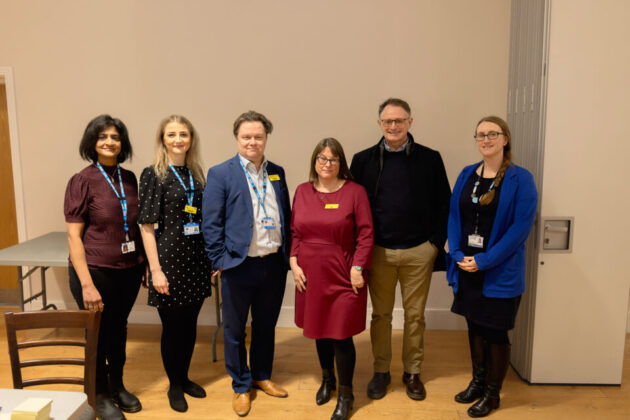
Over 60 people attended the day including colleagues from backbone services, all three of our places and from partner organisations. The aims of the day were to better understand what climate adaptation is and how our services can adapt to the changing weather patterns which cause disruptions in how we are able to deliver our services and types of care our patients will need.
We used forecasts of what the climate will be like in 2035 to consider how we continue to provide great care and keep our services running smoothly during extreme weather events.
Get involved and help us prepare our adaptation plans for the future. For more information, please email steph.pinell@nhs.net or our green champion.
Warm welcome to our first youth partner governor
The voting in of new governors took place in late 2024 and as a provider of services for young people, we know that they need a way to express their views with other young people. One way of doing this is by creating opportunities to become more involved in our trust as governors.
We now have two youth partner governors on our Council of Governors. These governors bring their own point of view, which is valued, giving young people a voice to make a difference to our services.
Champion Solesi is our first youth partner governor, with a second governor being appointed in the coming months. We caught up with her to find out how she feels and her hopes for the year ahead.

Champion said: I feel privileged to be a governor and will use my time getting to know the services and representing young people. I am very interested in medicine and long-term conditions. I hope this opportunity as a governor will give me greater awareness and understanding of learning disabilities in children. Sometimes young people can be socially isolated because people may not understand what it is, and I want to try and change this.
“I am very grateful for the support of Enioluwada the engagement and participation worker in the trust’s children’s services. She came with me to my first Council of Governors meeting and helped me with all the acronyms in the agenda. The governors’ meeting is a big meeting with lots of people, but Enioluwada made it less daunting, thank you.
“I am looking forward to my first year as a governor and to my induction in March which will give me a good grounding into the NHS. I am already a member on an advisory group representing children who use the services. I am hoping that these roles will give me more experience of the NHS and to be an advocate for children and young people and help me in my future career.”
First line manager development programme starts in April
We are improving our offer of training and development to colleagues who move into a line manager role for the first time. This is important because line managers give direction, set individual and team objectives, and offer crucial support to their teams, ensuring colleagues feel valued, supported, and cared for at work.
Positive experiences with managers empower colleagues to contribute their best work, while negative experiences can lead colleagues to disengage and, in some instances, leave the organisation.
The first line manager development programme has been established to equip line managers with the core knowledge and skills needed to effectively lead and thrive in their management role.
This innovative programme is available to all band 4 to 7 colleagues, across both clinical and backbone functions and is aimed at those new to a role with formal responsibility for managing others but can also be accessed by those requiring a refresher of the line manager role.
The programme explores what it means to be an effective leader and focuses on key processes such as safe and inclusive recruitment, managing people, handing difficult conversations and supporting employee wellbeing and attendance. The programme also offers colleagues support with understanding and managing budgets, performance data, and risk management to name but a few.
In addition to the above, the programme will also be supported by ongoing mentoring and coaching.
Look out for further information in your directorates.
New Carers’ Network launched
We know that many of our colleagues have caring responsibilities and that caring for someone can be tough, especially when you are trying to balance this with work, but you’re not on your own.
You told us in our staff survey that you wanted more support from the trust for your caring responsibilities. So we launched a new staff network for carers earlier this month.
The Carers’ Network offers colleagues, who also have some caring responsibilities outside the workplace, the opportunity to come together and connect with others who understand the challenges you may face and provide peer support. It also provides some practical advice and signposting.
We will provide an informal space where you can come together to help us to shape how the network can best support you.
Please come along to the network and find out more about it and share this information with colleagues who may benefit from the network’s support.
For an informal chat contact:
North Lincolnshire
New Rapid Assessment and Diagnostic Clinic for our memory assessment services
The memory assessment and therapy service (MATS) in North Lincolnshire has mobilised a new and innovative offer to our patients who have a memory impairment. By providing assessment, results, diagnosis and treatment options on the same day patients will receive more joined up care and wait less time.
The Rapid Assessment and Diagnostic Clinic (RAaD) has been set up from January 2025 with the aim to offer our services in a timely and effective way allowing us to offer patients an assessment, discuss their results, establishing if there is a diagnosis and offering the treatment options in a safe way utilising all the skills from the experienced staff in the team. The aim of this project is to reduce stressful and unnecessary waits for our patients.
When attending the RAaD clinic, patients are offered an appointment following some initial checks and tests and the clinic is run by experienced dementia specialists.
There are a number of benefits to the RAaD clinic. This new approach has adopted a new and efficient assessment process, diagnosis and treatment appointment in one, reducing resource and reducing patients attending different appointments as well as the wait. It brings together the Multidisciplinary team to ensure streamlined support. It offers appointments within two accessible clinical locations as well as care home visits and home visits with the same accessibility and support on the day of the assessment utilising the means of virtual teams contact or mobile with the consultant, so the formulation of a diagnosis can be considered and shared with the patient.
Our team is committed and enthusiastic to be part of this new initiative, ensuring our patient-focussed approach continues to be effective to ensure needs are met in a timely manner and to reduce the waits for various interventions. The team is working hard to maintain the momentum for this fast-paced initiative to ensure safe effective care and treatment while ensuring their own wellbeing is maintained. They are very proud to be offering this new way of working and are seeing the results daily and the satisfaction of the patients.
We are encouraging our patients to share their experiences using Care Opinion to help continue to shape our service offer. The feedback form devised for this project is obtained from every patient at the end of their appointment.
Some initial feedback from our patients, when asked what could we have done differently?
- Everything went really well in our meeting. I wasn’t rushed at all.
- A letter in bigger print to remind to bring glasses please.
- We are very happy with everything that has been done and discussed today.
- Very good, very understanding and caring.
- First rate service given and information given.
The project will continue into April with a view to continue this method of working as a hybrid model to keep waiting times down for our patients.
Share your feedback about our services via Care Opinion.
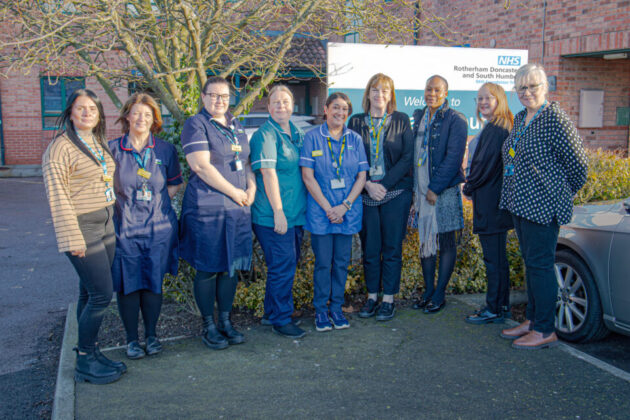
New trial offers alternative treatment for depression
Our community directorate in North Lincolnshire has teamed up with flow neuroscience to pilot an innovative treatment for people living with depression in a bid to enhance treatment options and reduce waiting times.
The flow trial started earlier this month (3 February 2025) with eligible patients who are currently on our waiting lists and offers an alternative treatment for depression.
This non-invasive treatment, called transcranial direct current stimulation (tDCS), involves the patient wearing a headset, for around 30 minutes, which applies a gentle electrical current to simulate an area of the brain which controls emotion. The treatment helps to rebalance brain activity responsible for regulating mood, sleep and motivation.
Claire Coppens, Consultant Nurse and Clinical Lead for the flow pilot, said: “We are excited to be part of this Flow pilot as a service evaluation, which includes a cohort of eligible patients that we feel could benefit from this innovative treatment offer. The enthusiasm we have found with both our community and workforce is inspirational. We are confident that this new treatment will have a positive impact with people who experience depression. It is a privilege that we are able to offer this to our community.”
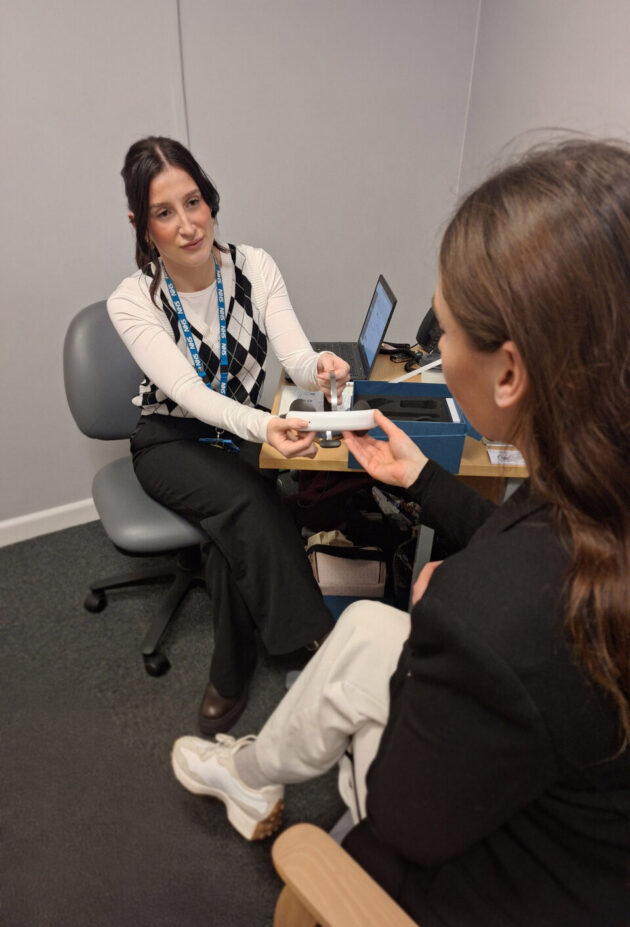
Feedback received so far from patients, volunteers and trust colleagues includes:
Daniel, Patient
“I’m really excited about an alternative to medication, to think about something different is really great. I’m really hopeful”
Samantha, Trust Volunteer
“It’s really exciting and innovative. I feel part of the flow team and included.”
Tina, Patient
“It’s a great idea and if it works, even better.”
Graeme, Trust Flow Support team
“Being part of this team has been like therapy for me, it has pushed me to do something new and I have learned so much. I have enjoyed supporting our patients to understand this new treatment offer.”
Louise Redhead, Service Improvement Manager in North Lincolnshire
“This is an amazing team with lots of experience and knowledge about this fantastic treatment offer, we are hopeful that this will have a positive impact within our community.”
North Lincolnshire volunteering event a success
We boosted our volunteer programme with 12 new volunteers recruited to take on roles in our services in North Lincolnshire.
The new volunteers came forward as part of the events we held in early February at the Central Library and at the Job Centre in Scunthorpe town centre.
Stuart Green, Patient Experience and Involvement Lead, said: “We are very pleased that so many people attended the events to find out more about the opportunities we have to volunteer with us. Volunteering is a great way to meet new people, give something back to the community, but also a route into employment by gaining valuable experience.
“We cover all out-of-pocket expenses for active volunteers as well as providing opportunities in training and development. Give volunteering a go and see where it leads to.”
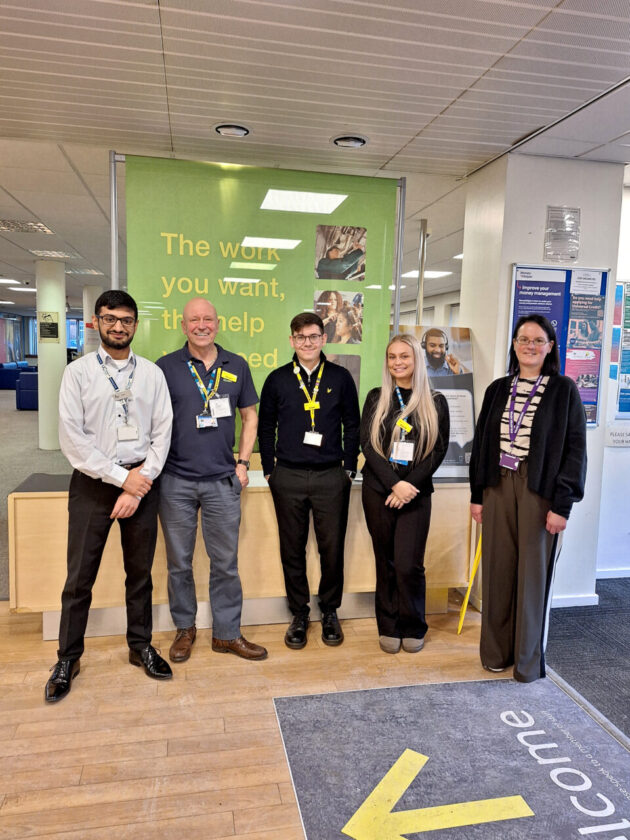
For those who were not able to attend the events and want to know more about volunteering, please email the volunteering team via rdash.volunteers@nhs.net.
Poverty proofing our services
Promise 6
“Poverty proof” all our services by 2025 to tackle discrimination, including through digital exclusion.
Promise 6 commits to poverty proofing all of our services by 2025 to tackle discrimination, including through digital exclusion. We are working with an organisation called Children North East and involves training teams about the impact of poverty on patients and their ability to access our services and engaging with patients and their carers. We do this to then identify how we can minimise the impact of poverty and support our patients.
We have a schedule for the rollout of our poverty proofing work with each service during 2025 and 2026. Three of our services have piloted this approach to help patients. These are:
- early intervention in psychosis service in Rotherham
- podiatry foot protection service in Doncaster
- children’s mental health services in North Lincolnshire
Find out about their experiences below.
Rotherham early intervention in psychosis service
The team is one of three services which have been involved with a pilot poverty proofing programme, supported by colleagues in the Children North East team.
We held a half day training event to look at health inequalities and poverty. It was clear on how people are more likely to experience poverty if they have poor health, due to being unable to work.
Mental illness is not as visible as a physical health condition, and it is important that all colleagues are aware of the big increase in risk of poverty for patients with a severe mental illness.
The team spent time feeding back personal experiences of working with patients, their families and carers in Rotherham who were experiencing a first episode of psychosis. It is not uncommon for the team to support patients to get food, clothing and to be able to travel to their healthcare appointments.
Colleagues in the Children’s North East team carried out one to one consultations with both staff and patients. Concerns expressed around poverty and the barriers to accessing services were highlighted.
Some of the challenges that patients and colleagues have shared include, having no access to phones, difficulty getting interpreters, non-attendances at our physical health clinic and attending social groups.
We are looking at introducing change and continuing the good practices that the team is doing.
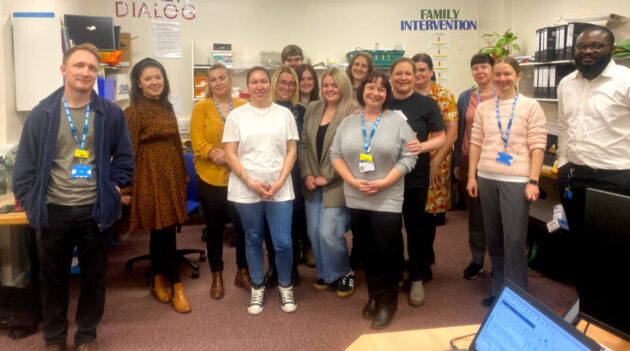
Podiatry foot protection service
In a bid to support the people who are less well off the service is helping patients, who cannot or should not be placing weight on their feet, to attend their appointments by letting them know about specific local transport such as the Leger bus and ambulance transport.
The service now offers more flexible appointment times. There are early morning appointments at 8am and later appointments at 4pm to help those patients who may have difficulty attending due to work commitments.
Clinics are available in Mexborough and Thorne to ensure patients from outlying areas can easily access care. There is close collaboration with other departments. When necessary, we arrange joint appointments (for example with our tissue viability and lymphedema service) to reduce the need for many different visits by patients, promoting more effective and integrated care.
Children’s mental health services in North Lincolnshire
The North Lincolnshire Child and Adolescent Mental Health Service (CAMHS) started its poverty proofing journey in October 2024.
Firstly, staff attended a training session delivered via Children’s North East. The bespoke training to North Lincolnshire in that it gave us local context while making us think as staff about the impact of poverty on a wider scale.
We then supported Children’s North East to meet with staff, parents and young people accessing our service to ensure we were getting feedback from a number of stakeholders.
Children’s North East has provided us with a comprehensive report based on their findings together with recommendations.
We have been able to generate an action plan for North Lincolnshire CAMHS. We have also been able to get ahead of implementing changes in other services in the area and our CAMHS service beyond North Lincolnshire. We have been proactive in removing the shame of poverty and ensuring that we as staff take responsibility to ask at each opportunity what support families need and guide them through the process to access this.
We are already implementing some changes arising from the pilots to support people with money and debt advice across the trust by working with Citizens Advice in each of our 3 places. Patients will be able to access support as part of their pathway of care.
To find out when your service is scheduled to be poverty proofed, please contact Steph Pinnell via steph.pinnel@nhs.net.
If you have a good idea which will support patients with cost of living challenges access services then please come forward. You don’t have to wait until your services goes through this process.
On site Citizen’s Advice service coming soon
As part of promise 6 to support patients living in poverty, we have been working with Citizens Advice in each of our places to start a dedicated advice service for our patients and colleagues.
We know that many of our patients, and some colleagues, experience challenges with money and debt and we are committed to supporting people to dal with these.
This means that we will have a Citizens Advice worker on site in Doncaster, Rotherham and Scunthorpe offering advice about money and debt issues to staff and our patients.
Citizens Advice will also support people to gain better digital access through providing digital devices, training and data.
Other support will also include helping us to gain a better understanding of the impact of poverty from an income point of view.
Keep an eye on the staff app for more information about how to access the services from the middle of March 2025 onwards.
Rotherham
Domestic abuse and suicide partnership training
Colleagues in our Rotherham services have teamed up with Hopian (formerly known as Rotherham Rise) to deliver training which provides a greater understanding of the links between domestic abuse, suicide, and the impact they have on people’s health.
Suicide and domestic abuse are not easy matters to talk about. With many people who experience these also being equally vulnerable to health inequalities because they find it difficult to access or receive the support they need.
This is why Marie Bailey, Crisis Team Clinical Lead, and Sally Blackett, Acute Directorate Service Manager, have been working with Wendy Frost, Senior Project Worker at Hopian, to come up with a training package which gives staff from both organisations knowledge of what to look for when assessing people who they come into contact with.
The aims of this new training were for people from both organisations to gain a better mutual understanding of the services and support each provide, and a greater knowledge about the risks and impact of domestic abuse and suicide.
Marie Bailey said: “So far 18 colleagues from our Crisis service and Home Treatment and Hospital Liaison team have been trained and we received great feedback from them. We invited Wendy from Hopian to be part of the session and as a result we have been invited along as part of Hopian’s staff training.”
Sally Blackett said: “We each have greater understanding of how our two organisations work together. This training provides both our colleagues and those of Hopian’s with the skills to identify and support people facing these dual challenges to ensure they get the right care.”
Hearing voices training
Earlier this month community groups came together to share their lived experience with our colleagues in mental health to help them to gain a better understanding of people who hear voices for possible recovery.
Members of the People Focused Group in Doncaster, and S62 Community Together Rotherham, teamed up with Peter Bullimore, who runs the National Paranoia Network, for three days of training on Maastricht Hearing Voices.
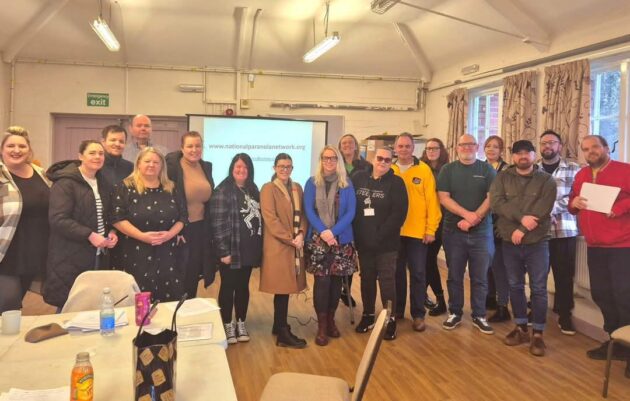 The aim of the training was to support mental health professionals to better understand paranoia and to help people to make sense of it.
The aim of the training was to support mental health professionals to better understand paranoia and to help people to make sense of it.
Marking Ramadan
Ramadan has begun and we thought we’d find out a bit more about it and explain to readers what Ramadan means to our Muslim staff.
Our Head of Spiritual Care Hassan Jamil tells us more.
When is Ramadan?
Ramadan is the ninth month of the Islamic calendar. Muslims believe that their Holy Book, The Quran was revealed to the Prophet Muhammad in this sacred month.
This year, Ramadan started on the evening of Friday 28 February and will end on the evening of Sunday 30 March, subject to the sighting of the new moon.
What happens during Ramadan?
Muslims fast daily from the break of dawn to sunset, refraining from all food and drink. Muslims will begin the fast with a pre-dawn meal, known as suhoor. The fast is broken in the evening at sunset with a meal called Iftar. Ramadan is also a time of increased prayer, reflection, and community. Many mosques around the country host Iftar gatherings and invite their local community to share in the experience of Ramadan.
Why do people fast?
Fasting is one of the Five Pillars of Islam, observed as an act of worship and obedience to God. It commemorates the month in which the Quran was revealed and serves as a time for spiritual growth. The Quran reminds us that able Muslims must fast during this month and that fasting is an act of reflection that was prescribed to the Christians and Jews before so that we can nurture empathy and duty to God.
What is the purpose of the fast?
Fasting helps Muslims develop self-discipline, gratitude, and empathy for those less fortunate. It encourages a focus on faith, prayer, and charitable giving.
What do people gain from fasting?
Many Muslims find fasting to be a deeply spiritual experience that strengthens their faith, enhances self-control, and encourages a sense of community. It is also a time for increased acts of kindness and self-reflection.
How can I support a colleague who is fasting?
Supporting a colleague who is fasting during Ramadan can be as simple as showing understanding and respect. Encouraging a supportive work environment, checking in on their wellbeing, and acknowledging the significance of Ramadan can go a long way in making Muslim colleagues feel valued.
Small gestures, like adjusting meeting times or allowing short breaks for prayer, can make a meaningful difference.
Colleagues may wish to take some leave during Ramadan, especially during the last 10 days. This should be accommodated where possible.
To all our Muslim colleagues, we hope you have a peaceful and spiritual month.
Let’s hear from our colleague
Let’s hear about Ramadan from Ali Hamed on YouTube, one of our charge nurses who works on Hazel Ward at Tickhill Road Hospital.
Watch out for a video from Izaaz Mohammed, our Executive Director of Finance and Estates which we will share during the month of Ramadan.
Events
Fast-A-Thon followed by Iftar at University Campus North Lincolnshire
Everyone is welcome to fast, learn more about Ramadan and Lent, observe prayer and to enjoy a free Iftar dinner.
If you would like to join us on 13 March at University Campus North Lincolnshire (UCNL), Ashby Road, Scunthorpe, DN16 1BU, and go hungry for a day so someone else won’t have to, please follow the steps below.
- Keep a fast or observe Lent. Follow the link below for more information on how to fast. Please note restrictions to fasting. UCNL event Fast-A Thon 13 March.
- Donate. Once you have decided to fast. Go hungry for a day so someone else won’t have to. Pledge your lunch money (or as little or as much as you can afford) to our chosen charity Scunthorpe Food bank by following the link below. There will be a collection box at the Iftar if you prefer to donate on the evening. Donate to Scunthorpe Food Bank.
- Nominate five other people to do the same.
- Book your free Iftar dinner ticket (breaking of the fast) meal. Food will be provided by the Muslim community of North Lincolnshire. To ensure that everyone is catered for please reserve your tickets for the Fast-A-Thon before 13 March. Please arrive promptly by 5:45pm ready for Iftar.
- Share. Following the event, share an optional photo of your Iftar using the #UCNLfastathon2025 on social media.
For more information, please contact University Campus North Lincolnshire information and advice office:
Interfaith Iftar on 25 March
An interfaith Iftar will be held on 25 March where there will be talks and food on offer. The event is likely to run from 5pm until 7:30pm. The event is currently being planned. Watch this space for full details in the near future.
We are working with South Yorkshire Council of Mosques to facilitate something for the multi-faith community during Ramadan in Rotherham. Date and venue to be confirmed on the app.
Talking therapies saved my life
Taxi driver Allan Bell has struggled with obsessive compulsive disorder (OCD) for 45 years and was “self-medicating” with whiskey, until his wife and employer told him to see a doctor.
 He followed their advice, was seen by a mental health nurse who referred him for counselling with our talking therapies service.
He followed their advice, was seen by a mental health nurse who referred him for counselling with our talking therapies service.
Now, after 20 hours of therapy, Allan has his condition well under control.
Allan (59), of Stainforth, said: “I’ve had OCD since I was 15-years-old. I would count, check, repeat things. I would ask my wife and son to do stupid things like touch a tin of beans four times, then eight times. They had to live with me and I don’t know how they put up with it.
“I would get home after a night shift and it would take me 30 minutes to lock the car door,” he explained. “I had to go out to the car, turn it on and off and pull the lock on the door. I had to keep repeating things again and again. It really affected my life. I just could not stop doing it. It made me anxious and depressed.
“I was cynical about Talking Therapies, I didn’t realise how specialist and good they were,” added Allan. “I was seeing a counsellor within a week. I don’t think I will ever be cured but now I’m controlling it, so I don’t get depressed.”
Initially Allan was assessed by counsellors as 90% depressed, now his score is down to 10%.
“The counsellor made me face my worst fears,” said Allan. “They helped me to learn how to control my anxiety. Talking Therapies gave me the skills and confidence to face the future. It really has saved my life.”
Watch Allan talking about his story on YouTube.
If you think NHS Talking Therapies could help you, visit NHS Talking Therapies or call on:
UNICEF Baby Friendly Gold standard
We have achieved the prestigious Gold Standard from UNICEF’s Baby Friendly Initiative (BFI).
This recognition underscores the unwavering commitment of our services to delivering high-quality, sustainable care for babies and their families.
The Gold Standard is rooted in four key themes: leadership, culture, monitoring, and progression. These themes form the foundation of the BFI standards, providing a clear roadmap for embedding improvements that will endure long term.
We will work with partner agencies to develop a North Lincolnshire action plan, further enhancing care once the official certificate of success is received from UNICEF.
The BFI assessment team highlighted several strengths in their glowing feedback. They praised the quality of evidence submitted and the meticulous planning that ensures Baby friendly standards are firmly embedded across services. They commended the unique collaboration between NHS and local authority public health teams, which has driven the initiative forward with remarkable success. Assessors noted the pride, enthusiasm, and commitment of staff at all levels. They emphasised the culture of kindness and compassion where trust colleagues feel valued and supported, and their achievements are recognised through excellence awards.
Dr Judith Graham, Director of Psychological Professionals and Therapies and the service’s Guardian, is an advocate for placing families and babies at the heart of service evaluation and project planning. Collaborative efforts between health visiting teams and maternity sites were also praised, showcasing a united front from the programme’s inception to achieving the Gold Standard.
Parents have shared their satisfaction with the service, with comments such as, “100% happy with my health visitor,” and “I’ve had so much support since leaving the hospital.”
The North Lincolnshire Hub groups also received positive feedback, further reflecting the dedication to supporting families. This achievement is a testament to our trust’s dedication to excellence and commitment to nurturing the next generation.
Written by Erin Smith, Volunteer.
New integrated risk, audit and quality assurance system Radar Healthcare
Radar Healthcare will be our supplier for our integrated risk, audit, and quality assurance system, replacing Ulysess, and will go live 1 May 2025. This will also be the system to report incidents on.
This new system will help transform how we manage our quality assurance, safety, and compliance, making it easier for our colleagues while enhancing safety for our teams and the patients we care for.
By replacing many systems and bringing processes together, clinical teams across multiple locations will have the ability to triangulate data, identify trends and make informed decisions to improve patient care, while integrated dashboards will deliver actionable insights from ward to board. Accessing triangulated data will allow leaders and clinical leaders to better identify where good quality care is being provided and where improvements are required.
Staff can access training on how to use the new system to report incidents. A 4-minute video and written guide will be available. Please encourage your teams to complete this on the April learning half day. More detailed training is available for leaders.
For further information, please contact:
Volunteering, a transformative journey for Matthew Claridge
We’ve successfully recruited 200 volunteers across the trust, which is promise 3, we still need to get to 350.
Volunteering has been a life-changing experience for Matthew Claridge, shaping his career in healthcare.
 Starting as a volunteer with us in February 2024 and advancing to the role of occupational therapy assistant at Great Oaks in North Lincolnshire, Matthew gained valuable insights into patient care and the importance of multi-disciplinary teamwork in the NHS.
Starting as a volunteer with us in February 2024 and advancing to the role of occupational therapy assistant at Great Oaks in North Lincolnshire, Matthew gained valuable insights into patient care and the importance of multi-disciplinary teamwork in the NHS.
Inspired by a passion for understanding human behaviour, sparked during his A-level Psychology studies, Matthew used his volunteering journey to build the skills and experience needed to secure a fulltime role. Here, he shares his story, lessons learned, and advice for aspiring volunteers.
When did you start volunteering with us, and where?
I started volunteering with the trust in February 2024, working in the Patient Flow team at the Onyx Centre on the Tickhill Road site.
How did you find out about volunteering in the NHS and at this trust in particular?
I discovered trust volunteering opportunities through an online search. After completing my second year of Psychology at the University of Leeds, I realised the importance of practical experience for career progression. Living near Tickhill, I was familiar with the RDaSH campus and enquired about voluntary positions in Psychology to build relevant experience.
How do you feel about becoming an occupational therapy assistant at Great Oaks?
It feels surreal. I love connecting with patients, helping them rediscover hobbies, and seeing their progress from admission to discharge. The variety of the role, from assessments to workshops and community outings, makes every day rewarding and reinforces that I’m on the right career path.
What got you interested in working in the NHS?
A-level psychology sparked my fascination with understanding behaviour and emotional responses. I wanted to use this knowledge to support others, and the NHS offered a platform to make a meaningful difference to a wide range of people.
How did you secure this job?
Volunteering with the trust gave me insight into inpatient care, multi-disciplinary teamwork, and patient needs. I shadowed professionals, undertook training like disengagement training, and tailored my applications to each job. My persistence and eagerness to learn helped me stand out as a strong candidate.
What advice would you give to aspiring volunteers?
Volunteering is invaluable. It offers flexibility, hands-on experience, and networking opportunities, helping you gain confidence and stand out in competitive fields.
Written by Erin Smith, Volunteer.
Could you use a volunteer in your service, or do you know someone who’d love to volunteer with us?
Whether it is shaking buckets for our charitable funds to driving patients to appointments and everything in between. If so, get in touch with our volunteering team:
Unacceptable behaviour and how to deal with it
We launched our unacceptable behaviour policy in late 2024. Dealing with unacceptable behaviour isn’t acceptable, you do not have to put up with it. Please remember that we have a policy which supports you to manage all types of discriminatory, abusive, sexual and antisocial behaviour. Some places have used the policy but not everywhere has so we wanted to remind you about it again.
The acceptable behaviour policy gives you guidance to follow when exposed to aggressive, threatening, and discriminatory behaviours. It helps you to be better equipped to avoid and reduce the risks of such behaviours.
Any kind of abusive, discriminatory or antisocial behaviour by any person is not acceptable.
However, given the broad range of services we provide and the diverse nature of the people we encounter, means that each situation will need to be assessed individually. In such situations, the responsible manager will do a risk assessment and put in place all possible measures to minimise risks to our colleagues and others to enable the continuation of care.
Abusive, discriminatory or antisocial behaviours may also be a criminal offence and in addition to the processes in the policy, it may also be necessary to report such incidents to the police.
Here is an outline of the actions to follow.
- If appropriate to do so, please talk to the person. This may be all that is needed to highlight unacceptable behaviours and minimise any potential incident. However, never engage in any challenge that would put you at immediate risk of further violence or abuse. You should always withdraw from any situation where behaviours displayed towards you may compromise your safety and that of your colleagues.
- If this doesn’t have the desired effect, then escalate to your manager for intervention.
- Your manager will liaise with relevant safety team (in the nursing and facilities directorate), to identify an appropriate response and support with the reported incident.
- The situation will then be assessed and there is a range of measures that may be put in place supported by the trust leadership team. Please see the policy appendix A Procedure for the management of unacceptable behaviours on our website.
- Report to the police for criminal investigation and possible prosecution where appropriate. Please do not put yourself at any unnecessary risk in terms of your personal safety. Phone 999 if there is any refusal to leave a trust building and or activate your lone working device if in a community setting to get immediate assistance.
Take time out to read the policy, maybe at the next learning half day, so that you know what we have in place to deal with unacceptable behaviour. To find out more search the website for the acceptable behaviour policy.
Doncaster
New service launches for people struggling with substance misuse
People in Doncaster can now self-refer and access a free NHS podiatry foot protection service.
Our community podiatry foot protection service based at Cantley Health Centre provides assessment and treatment plans for residents with foot problems.
Susan Batley, Podiatry Team Lead said: “Our service employs an enthusiastic team of podiatrists who provide a wide range of services to our local community. If you’re suffering from ingrown toenails, foot ulcers or painful feet, please get in touch. We do prioritise those with the greatest risk of potential limb loss, which tends to be those who have an underlying illness or condition that puts their legs and feet at an increased risk of injury or spreading infection.”
Services include minor surgery, sports injuries and biomechanics, musculoskeletal assessment, foot wound care and foot health education.
Residents registered with a Doncaster GP who meet the foot health criteria, can self-refer to this service at podiatry foot protection service, call us directly, or complete our online referral form, or call 03000 211 550.
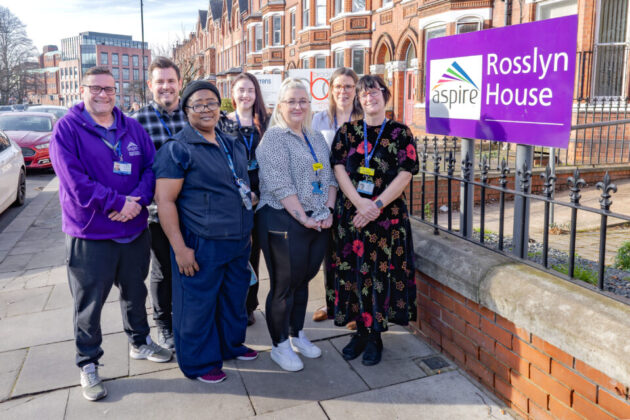
Supporting people with complex emotional needs
People living with complex emotional needs (CEN) are benefiting from an enhanced treatment pathway which helps them to manage their condition, its impact on their lives and relationships
This follows dedicated investment by our trust to support the team to deliver a full programme of dialectical behaviour therapy (DBT) to help patients to create a life worth living. DBT sits in the CEN Pathway alongside pre work, getting to know you phases and treatments of structured clinical management, one to one therapy, trauma stabilisation and post-traumatic stress disorder treatment.
DBT is a type of psychotherapy which usually lasts for 12 months and includes weekly one to one therapy, a two-hour weekly skills group as well as phone coaching and team consultation to provide the best care and treatment possible.
The team also delivered a full programme pilot with North Lincolnshire, and ran three shorter adapted DBT informed groups for people who did not need the full treatment offer as we transitioned into the new treatments. Informed groups have also been developed in Doncaster Early Interventions and Primary Care Mental Health services.
Reducing the impact of digital exclusion, people are given a choice of how they receive their treatment and can attend virtually or in person.
The team is involved in the recruitment of participants who are families or carers of people with CEN onto the Family Connections research study occurring in the trust.
With additional investment from the trust for two full DBT treatment packages, and using Health Education England funding, the team now has four staff who are all doing extensive two-year DBT training through Bangor University meaning a minimum of 28 patients per year can receive full programme DBT in Doncaster.
For any discussions or information please contact Alex Crew, Dr Alex Gibson or Dr Susannah Parker. More information can be found on our website by searching complex emotional needs pathway
Diamond Dignity month
Diamond celebrated Dignity Month this February in partnership with The Dignity Council.
While Dignity Day is traditionally on 1 February, this year, the council extended the celebration throughout the entire month with the theme “Three Little Deeds” spread kindness, respect and compassion and promote dignity. The Dignity Council is advocating all people to make a conscious effort to place these deeds into daily practice.
To bring this theme to life, clients and colleagues created decorative hands showcasing their individuality, which they can take home or proudly display on their wheelchairs. A Dignity Tree, adorned with uplifting messages, stands as a source of inspiration for all. Outside the Diamond building, hand decorations and positive messages have been placed on trees, available for passers by to take as a reminder that dignity is for everyone.
Additionally, Makaton signs promoting kindness have been displayed throughout the foyer, and a special poem, Three Little Deeds, has been written for the occasion.
Looking ahead, Diamond’s next event will be Red Nose Day on March 21, another chance to support such a meaningful cause.
Written by Erin Smith, Volunteer.
Congratulations on your Queen’s Nurse awards
Colleagues in our services have had lots to celebrate with 7 of them receiving the coveted Queen’s Nurse award.
This award recognises their dedicated service to the NHS, incredible commitment to continuous learning, leadership and excellence.
Well done and congratulations to Sophie Uzelac, Melissa Barton, Zoe Parker, Barbara Symonds, Katherine Tataryn, Katie Abson and Cheryl Jenkinson.
On receiving this award Melissa Barton, Perinatal Wellbeing Health Visitor and Specialist Public Health Nurse, said: “Becoming a Queen’s Nurse is an absolute honour and privilege. I couldn’t be more excited to join the amazing Queen’s Nurse network, and to keep learning from other inspirational, compassionate, and dedicated nurses. I am so proud of this title and hope I inspire other community nurses present and future to keep learning, share excellent practice and advance care in our communities.”
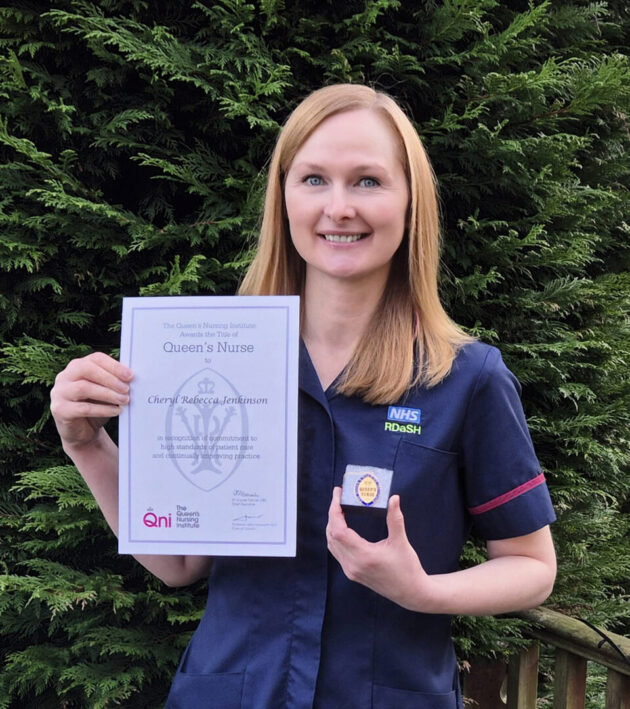
Cheryl Jenkinson, Nurse Consultant and Advanced Clinical Practitioner in Rotherham, said: “I am passionate about fostering collaboration and career development. I help lead a support group for advanced clinical practitioners across the trust, enhancing peer support and fostering professional growth.
“Throughout my career, I have been deeply committed to education and lifelong learning, completing several qualifications, including an advanced diploma in mental health nursing, a degree in addiction studies, and a master’s degree in advanced clinical practice. I am dedicated to sharing my knowledge and experiences, not only to benefit my patients but also to empower my colleagues.”
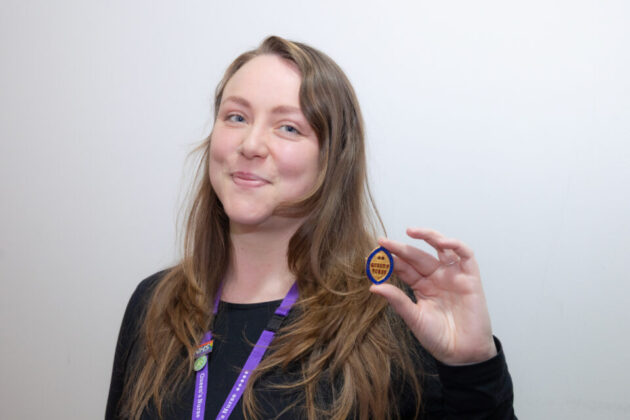
Katie Abson, Intensive Community Support Practitioner CAMHS, said: “The overall day was amazing, felt like a real celebration or nursing but the main moment that resonated with me was a comment of ‘how amazing it is to see nurses go above and beyond in the current climate, we see you,’ it was quite beautiful.”
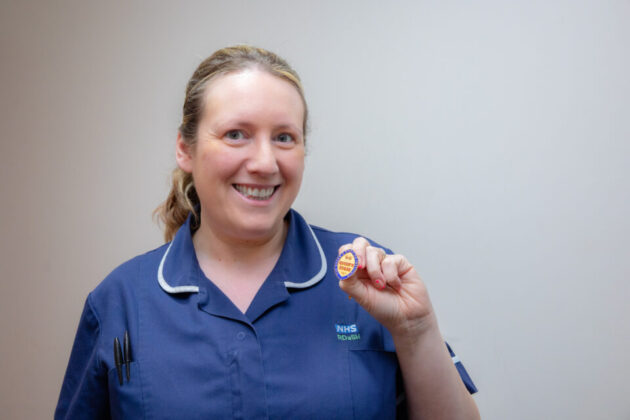
Kate Tataryn, Health Visitor, said: “The pride I felt in receiving my Queen’s Nurse award rivals that of when I first received my nursing PIN nearly 20 years ago. To be recognised with such high regard amongst other Queen’s Nurses is a reflection of the commitment I have shown to my profession and will continue to strive to do for the remainder of my career.”
Research conference
Save the date for our Research Conference which is taking place on 25 April 2025 at the New York Stadium.
The conference is entitled “A Recipe for Success” and will feature talks, presentations and fireside chats with community members, staff, and partners from industry, academia and other NHS organisations.
There will be a poster competition for research, service evaluation and innovation projects happening across the trust.
More details on how to register will be coming soon. If people would like to register their interest or have any questions, please contact the Grounded Research team on rdash.groundedresearch@nhs.net.
In memory of Mike Valentine
It is with great sadness that we learned of the passing of Mike Valentine, volunteer organist, after a short illness.
 Mike was a volunteer for the chaplaincy department for many years. A retired pharmacist and lead of the local ME group, his knowledge has been invaluable. He was always obliging when asked if he could play at any event in the chapel, including, Sunday services, midweek services, funerals, celebrations of life, Remembrance Day, Easter and Harvest.
Mike was a volunteer for the chaplaincy department for many years. A retired pharmacist and lead of the local ME group, his knowledge has been invaluable. He was always obliging when asked if he could play at any event in the chapel, including, Sunday services, midweek services, funerals, celebrations of life, Remembrance Day, Easter and Harvest.
He visited the wards on occasions, playing a small portable organ for patients who were unable to come to the chapel. When the chapel couldn’t get a bugler to play at the Remembrance Day service, he made the sound of a bugle on the organ and gave us a rendition of the Last Post.
Mike was involved in setting up the Dementia Choir on a Tuesday afternoon in the chapel, supported by Carol Bowyer.
Mike will be sadly missed by everyone.
Your Hearts and Minds charity
Community grants
Thank you to our Voluntary Community and Social Enterprise (VCSE) and community partners for their collaboration with our trust colleagues for submitting bids to our Your Hearts and Minds Community Grants Programme, which closed on Friday 14 February.
We launched the programme in January, inviting bids against our community grants fund for up to 30 grants valued between £1,000 and £3,000, and received 54 submissions in total for community activities and projects, which aim to benefit our local communities and develop greater mutual understanding and interdependence with trust services and the voluntary sector
The bids will be considered on 11 March by a joint panel comprising non-executive and executive directors of the Charitable Funds Committee, working alongside a VCSE representative from each of the three places, the general manager of Flourish and a patient representative.
We look forward to announcing the details of the successful bidders, will receive their grants on Wednesday 2 April.
Get fit, get strong, give back!
Our charity has been working with a fitness expert to launch a fitness programme with the aim of getting residents fitter and at the same time raise cash for a good cause.
Naomi Silvester, of Strong21 gym, in Stainforth, Doncaster, has launched the 12-week programme, called Cardio for a Cause, which aims to learn new fitness skills to participants, build their strength and improve fitness. It’s also a way of making new friends and through sponsorship can raise money for Your Hearts and Minds.
The 12 weeks will culminate in a team fitness competition to add fun to the fundraising challenge.
Anyone, of any fitness, can join in the 45-minute sessions which take place twice a week at Strong21 gym. In return for taking part in the fitness programme, participants are asked to raise a minimum of £200.
And the call for people to take part was launched on Time To Talk Day, February 6, because getting involved in activity and talking is great for mental health too.
Naomi, who is running the Cardio for a Cause challenge, said: “We are thrilled to partner with Your Hearts and Minds in our shared mission to promote health and wellness through accessible exercise for all. We believe that exercise is a fundamental right, not a privilege, and it is essential for fostering a healthier, happier community. By supporting this initiative, we not only enhance individual wellbeing but also contribute to a worthy charity that makes a meaningful impact. Together, we can empower more people to embrace an active lifestyle and improve their overall quality of life. Let’s make a difference together!
Neil Firbank, fundraiser at Your Hearts and Minds, said: “It’s fabulous that Naomi is running this challenge. It’s a great thing to get on board if you’re wanting to improve your fitness. There’s also a fun competition at the end and every penny raised will help good causes.”
The charity raises funds to support activities, projects, education, and research which go above and beyond normal NHS funding to improve the care and experience of patients.
Sign up to join the challenge.
Alex braves the ice to complete an epic adventure
Well done to Alex Bullivant for completing his 108-mile race Winter Spine Challenger South along the Pennine Way with a fantastic time of 41 hours, 58 minutes and 43 seconds, in sub-zero conditions on Saturday 11 January, raising a fantastic sum of £786.
 Doctor of Mathematical Physics Alex Bullivant (33) was one of 150 brave runners taking part in the Montane Winter Spine Challenger South, between Edale in Derbyshire and Hawes in North Yorkshire, taking a route across the moorland of the Kinder Plateau, Malham Cove and Pen-y-Ghent, raising funds for St John’s Hospice.
Doctor of Mathematical Physics Alex Bullivant (33) was one of 150 brave runners taking part in the Montane Winter Spine Challenger South, between Edale in Derbyshire and Hawes in North Yorkshire, taking a route across the moorland of the Kinder Plateau, Malham Cove and Pen-y-Ghent, raising funds for St John’s Hospice.
St John’s Hospice Fundraiser Tracey Gaughan said: “This took place on one of the coldest days of the year so far, so we’d like to say a huge thank you to Alex for his amazing support!”
Could you take on a personal challenge to raise funds for our charity?
Whether it’s running, walking, climbing, or even jumping out of a plane, we’re here to help you tick off the items on your bucket list with our fundraising activities. Here are a few dates for your diary and how you can get involved:
Charity Skydive, Saturday 7 June
Take a leap and do something daring!
Join us on Saturday 7 June at Skydive Hibaldstow for an opportunity to tandem skydive from 10,000ft. We already have seven supporters signed up and a limited number of places still available, so register your interest today to avoid missing out!
Registration with us costs £50 per person, all we ask is you raise a minimum of £300, and you’ll be helping us to support local patients and families who need our care and support.
Registration closes on Monday 31 March.
24 Peaks Challenge, Monday 16 and Tuesday 17 June
The Lake District 24 Peaks Challenge is the perfect test of endurance, right in the heart of the stunning Lake District.
This challenge is even tougher than the famous National Three Peaks. Over two demanding days, you’ll conquer 24 summits, covering impressive mileage and elevation, all within a 24-hour target time.
To take part, participants are required to raise a minimum of £250, supporting our charity. We’ve already got six supporters signed up hoping they’ve got what it takes to complete this exciting challenge!
Great North Run 2025, Sunday 7 September
Following last year’s fundraising total of £8,000, we’re hoping our supporters will put their best foot forward and take part in this year’s Great North Run.
Whether you’re a seasoned runner or a first-time runner, this is a fantastic opportunity to enjoy the world’s biggest and best half marathon, with 60,000 runners taking on the 13.1 mile route from Newcastle to South Shields each year.
Registration with us is free, all we ask is you raise a minimum of £400. All of our runners will receive:
- access to our exclusive training support from training professionals running with us as well as details of a helpline giving free email support service for our runners, if you have any questions at all about training, injury prevention and management, stretching or preparing for the event
- advice and support with your fundraising activities
- a charity running vest or t-shirt
- access to the NHS Charities Together marquee
- refreshments and goodies on the day
We already have eight runners signed up, so don’t miss out!
For more information on any of these events, please contact our team.
Save the date coffee morning
Finally, a reminder for our Easter Coffee Morning at St John’s Information Centre on Friday 4 April.
As well as enjoying a cuppa with lots of home-baked savoury and sweet treats, we’ll have a variety of stalls, a raffle and tombola. As the event coincides with the Easter school holidays, we’re also organising an Easter Egg Hunt in the afternoon for youngsters join in with some fundraising fun.
Watch our socials for more information coming soon.
New appointment for Diarmid
Congratulations to Dr Diarmid Sinclair who has been appointed as our new medical director with immediate effect.
 Diarmid was acting up in this role, after Dr Graeme Tosh, our former Medical Director left us.
Diarmid was acting up in this role, after Dr Graeme Tosh, our former Medical Director left us.
Welcome to the team
We welcomed Jim Cooper our new Deputy Chief Nursing Officer and Deputy Director for Infection Prevention and Control and Facilities, to team RDaSH earlier this month.
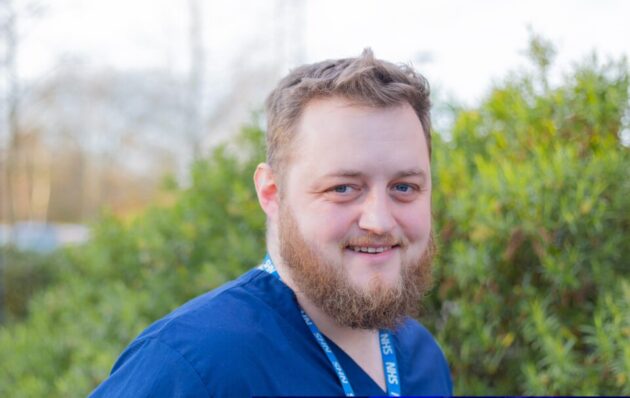 He joins from Sheffield Teaching Hospitals where he was assistant chief operating officer for operational flow and discharge. Jim is a registered nurse by background and is an experienced advanced clinical practitioner who still practising clinically in primary care.
He joins from Sheffield Teaching Hospitals where he was assistant chief operating officer for operational flow and discharge. Jim is a registered nurse by background and is an experienced advanced clinical practitioner who still practising clinically in primary care.
He has previously been the trust lead for advanced clinical practice at The Rotherham Hospital NHS Foundation Trust.
Backbone recognition awards
All of our 6 groups now hold their own Reward and Recognition events, 5 care groups and backbone services. During February we celebrated colleagues in our backbone services who had been nominated but not shortlisted in last year’s annual awards at a recognition event.
Presented by Philip Gowland, Director of Corporate Assurance, and Izaaz Mohammed, our Director of Finance and Estates, colleagues received a certificate to recognise their achievements.
See all the pictures from the event.
If you would like to nominate a colleague for a backbone or care group recognition award, you can do so via the Staff Portal by searching in the questionnaires area for “Care Group and Backbone Directorate Reward and Recognition”.
Flourish news
Activities on offer
For those of you who are fed up with being stuck in the house then pop on down to Flourish at Woodfield Park and join the many free activities happening every week.
There are group read poetry sessions, feel good singers, wellness walks and sessions to learn to ride a bike on offer.
You can also book Mother’s Day Afternoon Tea, priced at £20.50, served in The Library at St Catherine’s House.
Ashley Evans, Operations Manager at Flourish said: “Many people don’t realise just how much we offer the community at Flourish. We run a lot of free events for all to enjoy, there’s always something different for people of all ages and abilities”. See all our events on offers.
Volunteers needed
Do you have some free time that you don’t know what to do with? If so, why not volunteer to be a Community Palliative Support Befriender with Woodfield 24.
Woodfield 24 Care Services, who offer end of life care in the community, are looking for volunteers who can offer companionship to patients on their end-of-life journey in their own homes. Care experience is not required, just compassion and sensitivity are needed to carry out this rewarding role.
If you’re interested, the hours are flexible and travel expenses will be paid, non-drivers are also welcome to apply. Woodfield 24 Car Services are part of Flourish, a Community Interest Company in Doncaster that aims to provide work, vocational training and therapeutic opportunities to people who need support. They work with partners and stakeholders to provide a valuable contribution to the local community and provide opportunities for community involvement with those that need it the most.
To find out more about this volunteering role contact:
Charity art exhibition
A fine art exhibition is going to be staged in Doncaster to raise money to support families in need in both Doncaster and Bangladesh.
The Mosobbir Ali foundation in partnership with Flourish hold the exhibition at St Catherine’s House, Woodfield Park, Doncaster on Friday 2 May until Sunday 4 May 2025.
The exhibition will offer work from leading Yorkshire and Northern Artists, with many having been recognised and exhibited by the Royal Academy of Art.
Flourish is a Community Interest Company in Doncaster that aims to provide work, vocational training and therapeutic opportunities to people who need support. They work with partners and stakeholders to provide a valuable contribution to the local community and provide opportunities
for community involvement with those that need it the most.
The Mosobbir Ali Foundation is a Doncaster registered charity based in Bawtry, registration number 1189988. Its aims are to prevent or relieve poverty in Bangladesh through building new homes, providing food aid at times of crisis and providing aid to improve sanitation and access to fresh water in local communities.
Profit from all work sold during the exhibition will support the work of both organisations.
Steve Gilman, Managing Director of Flourish, said: “What a great way to support families in need in both Doncaster and Bangladesh. I’d encourage everyone to come along because all of the profit will go to supporting families who really are in need.”
Eggstra Easter fun to be had
There will be “eggstra” special fun on Good Friday when an annual Easter Fayre gets underway in Doncaster.
Flourish Enterprises annual Easter event will take place at Woodfield Park, Tickhill Road, Balby, on Friday 18 April. Everyone is welcome to come and join in the free fun.
Ashley Evans, from Flourish said: “It will be a fantastic fun day for all the family with craft stalls, bouncy castles, face painting, Easter egg hunt, arts and crafts and much more. There will also be an Easter parade. The Walled Garden and Café Flourish will also open for refreshments, plus ice cream for anyone who fancies a treat.”
The Fayre runs from 10am to 4pm with free entry and free parking.
Flourish is a Community Interest Company based in Balby, Doncaster, that aims to provide work, vocational training and therapeutic opportunities to people who need support. They work with partners and stakeholders to provide opportunities for community involvement with those that need it the most.
Your right to be heard
This is where you can get in touch about topics of interest, either work related or something else. Here are the latest questions people have sent in.
I’m a band 3 and when the real living wage comes in, I will only be paid a tiny bit more than someone on a band 2, it doesn’t seem fair?
Thanks for voicing your opinion on this. As you might expect, the Board does not agree that this is unfair. In your role you will receive increments in line with national terms and conditions. Someone whose wage is uplifted for the real living wage will not do so until their banded rate reaches that wage. But in the meantime, they will receive a wage that is sufficient to live on. This is a change in our trust, but one that will help to tackle poverty among our colleagues.
Answered by Richard Chillery, Chief Operating Officer.
So far, I’ve not been able to have a learning half day because of my work patterns on the ward. Could the dates and times reflect the different work patterns please?
It is really important that protected learning time is available across the trust. It is a big benefit for all of us who work in the trust. Protecting this time for our ward-based staff is challenging but equally important to do. Some wards have managed to create some time for some colleagues via the roster or creating time elsewhere in the month even if not on the learning half day date. We know there is more to do to get this right and we will be reviewing how it is going shortly and will consider how best we can support our inpatient colleagues with their learning going forward.
Answered by Dr Jude Graham, Director of Psychological Professionals and Therapies.
Why is there an investment fund when we have to save money?
We want to move money around to spend more of every pound on patient care. We are clearly operating in an NHS financial regime, in 2025 and 2026, as Toby has talked about in video logs, which is very difficult. But the Board remains determined to try and divert funds to address inequalities and improve patient outcomes.
In any service, corporate or clinical, we have to demonstrate we are delivering value for money and working to become more effective and more efficient. There are loads of things we can do to help with that, whether it is using technology better, or making best use of scarce clinical expertise. In 2025 and 2026 we will be investing to reduce waiting times for care, to bring peer support workers into our teams, and to ensure senior clinicians have the right amount of administrative support.
I hope that seems wise to you.
Answered by Izaaz Mohammed, Director of Finance and Estates.
Please send us your letters either by email to rdash.rdashcommunications@nhs.net or you can post them to us, anonymously or with your name, to Woodfield House, Tickhill Road, Doncaster.
Toby’s last word
There are so many things I could focus on in this page, and that reflects both how busy public services are, and how much tremendous work goes on across our trust, increasingly work that involves peer support workers, volunteers, and communities’ voices. Within Trust Matters this month, is the fantastic news about tackling poverty pay, through the real living wage, together with the results of our early adopters work on poverty proofing.
I am delighted to welcome Diarmid Sinclair to our executive team, providing a strong and engaging medical voice within the board as our chief medical officer. And it is just as important that line managers across the trust are skilled and supported in their work, with the new “first line managers” programme from April to enable, I gather for the first time ever here, an expectation that those in people management roles have some specific core skills. Managing a team is a specialist skill!
Instead of writing about everything, I am going, this month, to focus on promise 14. Promise 14 commits us to have nobody waiting for care beyond four weeks.
Four weeks in an NHS where some people can wait years. Four weeks when teams are working hard and must not be asked to just work harder. So first of all, why four weeks? We wanted a time period that is human and easy to manage (18 weeks is important, but not exactly common parlance). And we wanted a wait time short enough to remove a lot of work to categorise and risk assess at referral, in most services, four weeks, will mean we have an urgent cohort and then routine, seen inside four weeks.
I have spoken elsewhere about talking with CAMHS colleagues and with individuals in our memory services about their pride in meeting this measure. We come to work to do a great job, all of us. From the pandemic of 2020 onwards, it can be intensely difficult to talk with neighbours, friends or family about their NHS. They protected it, as we were asked to do. And, often now, doubt it will be there for them or their loved ones. The whole point of our promise 14 is to restore certainty and trust to our relationship with both of patients and our GP partners.
Clearly, fast must not be furious and must not be quantity over quality. No one is being asked to work long into the evening. Nor to distort clinical priorities. Instead, and there is an article in this Trust Matters about quality improvement, we are looking to work differently to expand the number of people we can. Removing activities that take up time that could be better spent, sharing work across a team, and re-designing pathways and processes to deliver. This feels like a mission all of us can unite to deliver.
This month Victoria Takel and care group directors are setting out their analysis of the waiting lists that we have. Richard Chillery has briefed the board and the council of governors. Later in March we will make a small number of investments to help with delivery of Promise 14. But the heart of the promise is changing how we work, what job plans we have across professions, and the rigour with which we undertake clinical administration. It requires work in every service, from wheelchairs to talking therapies. I hope it is work that we can all lean into in the months ahead. Get in touch if you want to talk about it. Happy to listen and to think with you.
Toby Lewis on X: TobyLewis_NHS.
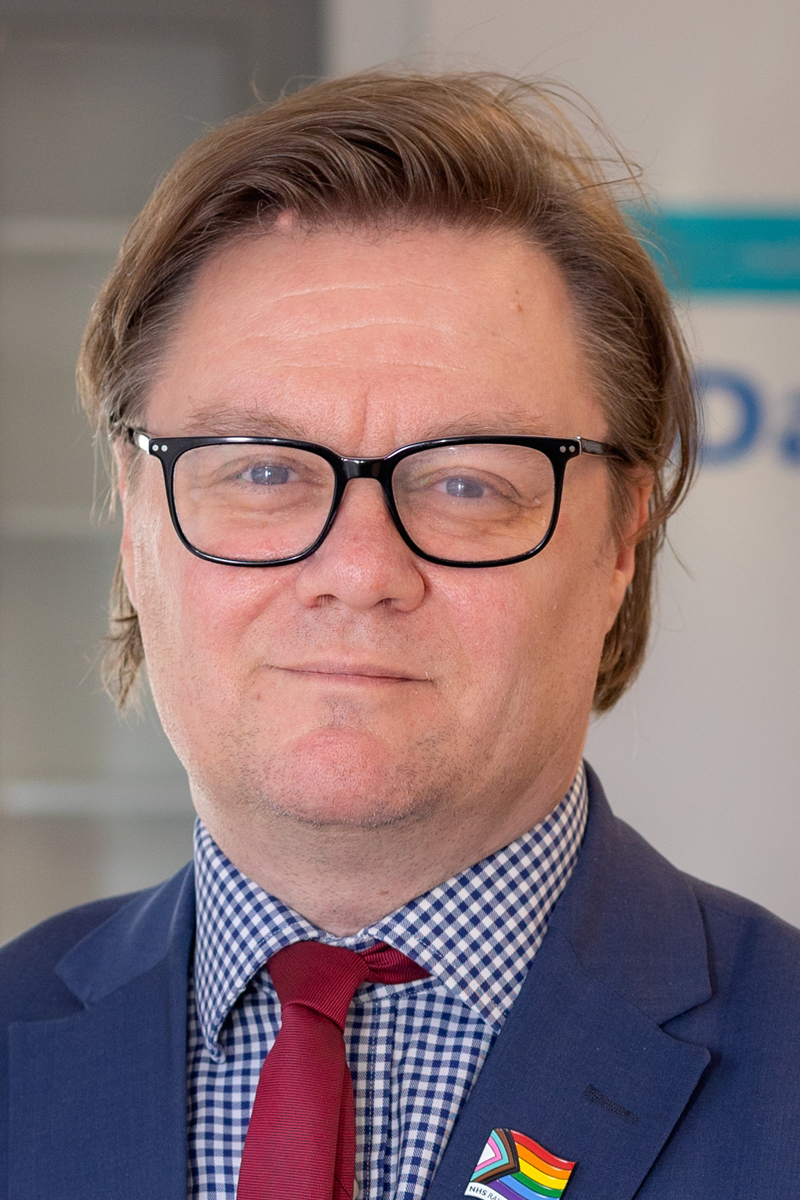
Page last reviewed: June 23, 2025
Next review due: June 23, 2026
Problem with this page?
Please tell us about any problems you have found with this web page.
Report a problem